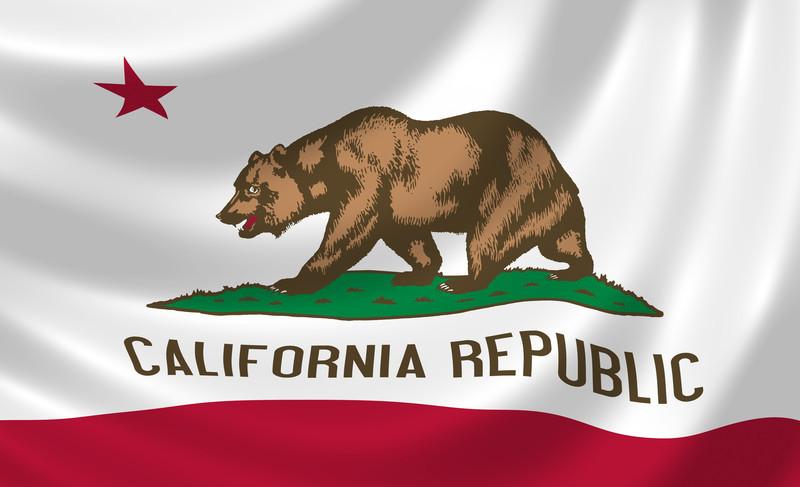
Talk about irony.
In 1845, the government in Mexico City ordered the Mexican governor of Alta California to deny entry to immigrants from the United States, and to disallow land grants, sales or even rental of land to noncitizens already present in California. All immigrants from the United States also were threatened with deportation, having “arrived [into Mexican possession] without permission.”
The rebel Bear Flag Revolt in the territory, followed by the unqualified U.S. victory in the Mexican-American War, resulted in the raising of the U.S. flag over Sonoma and Monterey. Commodore John D. Sloat, commanding the U.S. Navy’s Pacific Squadron, proclaimed in 1846: “Henceforth [the Republic of California] will be a portion of the United States.” Formal statehood was granted in 1850.
Fast forward to 2018, and the state of California is rapidly moving to, among other things, favoring undocumented immigrants in arguable violation of the Constitution of the United States.
After the 2016 presidential election of Republican Donald Trump, California Democrats quickly initiated public policy efforts in opposition.
The California State Legislature launched the first shot in the ideological war, hiring the controversial former Obama administration Attorney General Eric Holder to a $25,000 per month contract to advise political strategy. Holder previously had been held in civil and criminal contempt of Congress over his refusal to turn over documents in Operation Fast and Furious, a “gunwalking” scandal that implicated Mexican and U.S. officials.
Gov. Jerry Brown, now in his final year of four terms as California’s governor, signed SB 54, which bans local officials from asking about a person’s immigration status, joining some three dozen local communities that proclaim “sanctuary” status, making California the nation’s most popular destination for undocumented immigrants.
Brown has since engaged in a heated war of words with Trump, and recently offered executive clemency — pardons and commutations — to immigrants who faced deportation for convictions for such crimes as beating and terrorizing a spouse, kidnapping, robbery, use of a firearm, drug sale and possession, and vehicle theft.
California’s appointed attorney general, Xavier Becerra, whose mother was from Mexico, is a former U.S. congressman who worked to grant legal status to 11 million undocumented immigrants in the U.S., including about 2.3 million in California.
With a budget of some $200 million, Becerra’s office has sued the Trump administration 28 times over travel bans on selected refugees from troubled Muslim countries, a proposed military ban on transgender people, Obamacare cost-sharing subsidies, the religious rights of employers not to offer birth control via employee’s health insurance, student loan debt relief, and a host of environmental rules and regulations on energy use, greenhouse gas emissions, coal on public lands, natural gas flaring, oil and gas royalties, and the Clean Air Act.
After the 2016 presidential election of Republican Donald Trump, California Democrats quickly initiated public policy efforts in opposition and open rebellion.
Promoting a “resistance movement,” Democratic officials also sued the Department of Homeland Security and U.S. Customs and Border Protection over the proposed border wall in San Diego, and joined lawsuits against the Trump administration’s policy to negotiate a congressional resolution to former President Barack Obama’s Deferred Action for Childhood Arrivals (DACA) decision temporarily to extend the stay of some 800,000 undocumented immigrants who were brought to this country as children. Trump proposed a path to citizenship for some 1.8 million undocumented immigrants, but the Democrats rejected the “deal” because it included funding for a border wall.
California also filed suit against the federal government for withholding public safety grants from cities and counties that do not expend public resources on immigration enforcement. California receives some $28 million per year in grants for crime prevention, drug treatment and mental health care.
California recently sued again to oppose the Trump administration’s reinstatement of the citizenship question on the 2020 U.S. census, arguing that noncitizens fearful of deportation might be undercounted, costing the state federally allotted funds.
The campaign against the Trump administration also includes formally declaring California a sanctuary state, and using taxpayer funds to defend criminal defendants accused of crimes, including convicted criminal immigrants fighting their deportation proceedings.
State Senate President Pro Tem Kevin de Leon, a Democrat who is challenging Sen. Dianne Feinstein in the June 5 primary election, recently appointed the first undocumented immigrant without any legal protected status to a statewide post. Framing the appointment as a rebuke to Trump’s policies, de Leon tapped attorney Lizbeth Mateo to the California Student Opportunity and Access Program Project Grant Advisory Committee.
Previously, de Leon had asserted that “half my family is here illegally,” acknowledging they had obtained stolen identities, false Social Security cards, and driver’s licenses to obtain work permits and employment green cards.
Oakland Mayor Libby Schaaf warned constituents of an impending raid by ICE agents, preventing authorities from making 800 arrests. State officials have now threatened the Orange County Sheriff’s Department with criminal prosecution for cooperating with federal authorities.
The mayor of Escondido lashed out at California officials whom he claims are protecting violent criminals and risking public safety. Various other city councils, including that of border city San Diego, have taken up resolutions opposing the state’s approach.
The federal government is also not pleased. Speaking to the California Peace Officers Association in Sacramento, U.S. Attorney General Jeff Sessions declared that California’s politicians are obstructing immigration enforcement and putting law enforcement officers and the public in danger.
The author of San Francisco’s sanctuary city law, civil rights attorney and Democratic mayoral candidate Angela Alioto, is now promoting a ballot measure that would remove sanctuary protections for violent felons.
Advocating for the rule of law and aware of the pain of the families of victims of MS-13 gangs from El Salvador and other undocumented immigrants, Sessions has followed the lead of Trump, who campaigned strongly against the “catch-and-release” policies that led to the killing of Jamiel Shaw II, Kate Steinle and others.
Steinle, 32, was killed in July 2015 by a gunshot fired by Jose Ines Garcia Zarate, a 45-year-old undocumented immigrant, as she walked with her father on Pier 14 in San Francisco. Her father said her last words were “Help me, Dad.” [Editor’s Note: A jury in November acquitted Garcia Zarate of murder and manslaughter charges after his defense attorney argued that Garcia Zarate fired the gun accidentally. The jury found Garcia Zarate guilty of being a felon in possession of a firearm, for which he was sentenced in January to three years in prison — and then released after a judge credited him with the time he had already spent in custody.]
The federal response to all of this California political activity has been mixed. The U.S. House passed “Kate’s Law,” but the U.S. Senate failed to advance the legislation defunding sanctuary cities and increasing minimum punishments for previously deported undocumented immigrants caught illegally returning to the U.S.
Congress also has been unable to craft comprehensive immigration reform measures that might clarify the status of undocumented immigrants, improve border security, fully fund a border wall (including fencing plus technology), enforce employer ID laws and deter future and continuing illegal invasion by “caravans” of economic migrants from throughout Central and South America migrating across the U.S. southern border.
The president recently has tied NAFTA trade negotiations to his complaints that Mexico is not “helping us at the border,” and has expressed exasperation that California would affirmatively harbor violent criminals. Democrats have in turn denounced the president for intemperate remarks about rapists among the “coyotes” who prey on poor migrants working their way up from Central America through Mexico to the U.S. border.
Sessions said California’s actions “directly and adversely impact the work of our federal officers” and “undermine the duly-established immigration law in America.”
The Justice Department has filed a lawsuit that takes aim at three California laws that a) prohibit private employers from giving immigration officials access to workplaces or documents for enforcement without a court order; b) create a state inspection system for immigration detention facilities; and c) limit what state and local law enforcement authorities can communicate about some suspects.
Sessions noted that states cannot pick and choose which federal laws they respect. “Just imagine if a state passed a law forbidding employers from cooperating with the Occupational Safety and Health Administration in ensuring workplace safety. … or the Environmental Protection Agency for looking after polluters. Would you pass a law to do that?”
To Oakland Mayor Schaaf, Sessions protested: “How dare you? How dare you needlessly endanger the lives of our law enforcement officers to promote a radical open-borders agenda?”
When Trump recently asked border state governors to send the National Guard to the U.S. southern border, Arizona, New Mexico and Texas said yes. California’s Gov. Brown reluctantly agreed to send 400 guardsmen to San Diego, but declared [they] “will not be enforcing federal immigration laws.”
The Rise and Fall of the California Dream
There have long been “dreamers” of Eureka! arriving in the Golden State.
German-born Swiss entrepreneur John Sutter arrived in 1839 on the brig Clementine to the small seaside port of Yerba Buena (now San Francisco) and promptly received permission from Las Californias Gov. Juan Bautista Alvarado to settle Sutter’s Fort in the area that eventually became Sacramento.
Sutter built an empire of agriculture, and watched as U.S. Army Major John C. Fremont led troops into California in 1846 at the outbreak of the Mexican-American war. The victorious Americans, at the war’s settlement, bought California and all other territory north of the Rio Grande from Mexico for $15 million. (Fremont went on to become California’s first U.S. senator and the first national Republican candidate for U.S. president in 1856).
In 1848, one of Sutter’s trusted employees discovered gold nuggets at Sutter’s Mill on the American River. Attempts to keep this astonishing find a secret failed, and soon Sutter and his son found their properties overrun by some 300,000 American and foreign “49ers” in the gold rush that launched the rapid growth of California and its farmlands, ranching, ports, infrastructure, railroads and multifarious industries.
California began a long ascent into cultural prominence and economic dominance. Ambitious California inventors and entrepreneurs imagined and built Hollywood and Orange County’s Disneyland, Silicon Valley and San Diego’s impressive tech and bio-tech communities, world-class wineries and the fruit and vegetable farmers market to the world in the Central Valley.
Attracted by superb climate and gorgeous coastlines, beaches, mountains and deserts, a casual lifestyle and a “have a nice day” vibe, along with the Beach Boys and California girls, generations of immigrants have settled into a global melting pot/salad bowl so diverse that some 200 languages are spoken by large diaspora communities from Asia, Africa, Europe, the Middle East and Central and South America.
With a GDP of $2.5 trillion, California today ranks as the fifth largest economy in the world, after the U.S., China, Japan and Germany, and ahead of the U.K., France, India, Italy and Brazil.
Unfortunately, the California golden dream is rapidly becoming tarnished by rising crime, crumbling infrastructure, extraordinary traffic and crowding, exorbitant housing costs, and some $1 trillion in unfunded public debt. The middle class is now fleeing the state — some 100,000 move out annually.
Astonishingly, California now ranks last or almost last among the 50 states in almost every important measurement — poverty (one-third of the nation’s welfare cases live in California), tax burden (the nation’s highest combined state income, property, sales, local, capital gains, vehicle registration and gas taxes), a punitive and complex regulatory environment and harsh business climate, and fourth- and eighth-grade math and reading educational results.
What happened? One-party statism, massive importation of poverty via undocumented immigration, a tax system that is volatile and too dependent on the very top percent of high-income earners for state revenue, a series of public policy choices leading to early release of criminals, and severe environmental restrictions that create chronic drought and a cap on the housing stock, deterring business investment and growth and opportunity.
Analysts also point to the dominant political power of public employee unions, which have hurt investment in education, public services and infrastructure because of the ever-expanding fiscal costs of high public employee salaries and lifetime pensions.
The Coming Secession?
For all its economic success and warm spirit, California has had a contentious political history.
At one end, early 20th-century progressive Republican Gov. Hiram Johnson championed the country’s most populist “direct democracy” system, via statewide initiatives, propositions, recalls and referendums. Johnson went on to become California’s longest-serving U.S. senator and was an isolationist and advocate of the U.S. Immigration Act of 1924, which severely restricted immigration.
On the other end, Cesar Chavez led the midcentury migrant farm workers rights movement in the agricultural fields of Central California, earning the Presidential Medal of Freedom.
He opposed illegal immigration.
Conservative Richard Nixon served as a GOP California member of the U.S. House and Senate before becoming vice president and then president, while liberal Republican Earl Warren was elected to three consecutive terms as California governor. The former member of UC Berkeley’s Boalt Hall Gun Club “secret society,” Warren rose to prominence as chief justice of the U.S. Supreme Court.
Democrat Gov. “Pat” Brown, Jerry’s father, is respectfully remembered for investing in the future by building major water, freeway and educational campus infrastructure projects, but his son now champions “The Great Train Robbery” — a highly controversial intrastate bullet train project whose costs have soared from $20 billion to $77 billion and are rising.
Conservative Republican Gov. Ronald Reagan battled with student radicals such as Tom Hayden at UC Berkeley in the 1960s before succeeding to the U.S. presidency, and activist Howard Jarvis successfully promoted the nationally replicated Proposition 13 effort to limit state tax hikes on elderly California homeowners.
But the last time California elected a Republican U.S. senator was 30 years ago, in 1988, with the election of popular Pete Wilson, who then went on to defeat Dianne Feinstein for governor. He endorsed Proposition 187, the voter-approved ballot measure denying public services, such as public education and health care, to undocumented immigrants.
Although most of its provisions were struck down in court, passage of this immigration initiative was a seminal event in California political history. It energized a growing Latino voter population and damaged the image of the Republican Party, which was most closely associated with the measure, helping turn California into one of the bluest states in the country.
Today, Democrats hold a “super majority” in the California state legislature and occupy 39 of the state’s 53 seats in Congress. The leading candidate for governor in 2018 is San Francisco liberal firebrand Gavin Newsom, famous for yelling that he endorsed gay marriage “whether they like it or not.”
Without much political balance, therefore, California’s politics appear to be accelerating into a radical “state’s rights” approach to the federal government not seen since the South opposed President Abraham Lincoln before the Civil War























 More news and opinions than at a Shabbat dinner, right in your inbox.
More news and opinions than at a Shabbat dinner, right in your inbox.